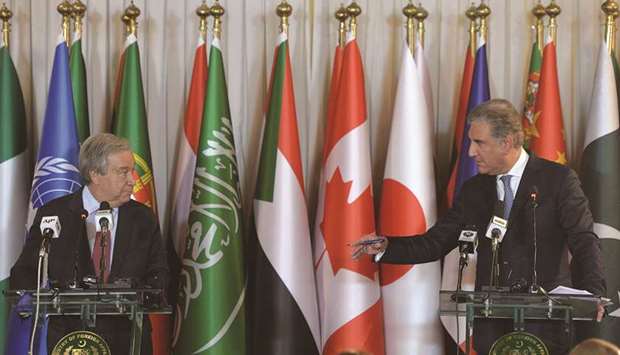United Nations chief Antonio Guterres began a four-day visit to Islamabad yesterday by underlining his fears concerns about tensions between Pakistan and India over the disputed Kashmir region.
“I am deeply concerned,” he said at a joint press conference with Foreign Minister Shah Mehmood Qureshi, pointing to renewed clashes between the South Asian nuclear-armed neighbours in recent months.
Guterres reiterated his offer to facilitate talks in search of a solution to the dispute, while stressing the need to take steps to de-escalate both “militarily and verbally”.
India and Pakistan have thorny relations and have fought three wars, two of them over the disputed Kashmir region.
Tensions have been running high since a decision by India in August to strip the region of Kashmir of its special autonomous status in a decision that angered Pakistan.
Pakistan reacted by downgrading diplomatic relations with India, suspending bilateral trade and cross-border transport services.
“Diplomacy and dialogue remain the only tools that guarantee peace and stability with solutions in accordance with the Charter of United Nations and resolutions of the Security Council,” Guterres said.
The UN secretary-general praised Pakistan for its crucial role in Afghan peace process and for hosting Afghan refugees.
“Today we are being seen as part of solution. There was time when Pakistan was seen as part of the problem by the international community,” Qureshi said.
The UN secretary-general was in Islamabad to meet Pakistani leaders, discuss topics including sustainable development, climate change, and peacekeeping, and participate in a conference on Afghan refugees.
Pakistan is organising an international conference with the UN refugee agency UNHCR, marking 40 years since hundreds of thousands of Afghans found refuge in the country.
The ministry said that the UN secretary-general’s participation in the conference is “recognition of Pakistan’s exemplary compassion, generosity and resolve in hosting Afghan refugees for the past four decades and our efforts for peace and stability in Afghanistan”.
The country has been hosting one of the world’s largest Afghan refugee communities who fled to Pakistan after their country was invaded by the Soviet Union in 1979 and during later conflicts.
Pakistan has announced plans to expel Afghan refugees several times, but these decisions were never followed through and deadlines have been extended.
Speaking on climate change, the UN chief said that governments must deliver decisive actions and “transformational change” to combat global warming.
Guterres criticised a recent climate summit in Madrid.
The so-called COP25 climate talks in the Spanish capital in December were supposed to build on breakthrough promises made at the 2015 UN Climate Change Conference in Paris.
Instead, governments equivocated and observers decried their response as inadequate and unambitious.
“Our planet is burning but too many decision makers continue to fiddle,” Guterres said. “The only answer is decisive climate action ... gradual approaches are no longer enough.”
A United Nations panel concluded late in 2018 that avoiding global climate chaos will require a major transformation of society and the world economy.
The landmark report said global CO2 emissions must drop 45% by 2030, and reach “net zero” by 2050, to cap temperature rise at 1.5° Celsius, the safe cap set as a goal in the Paris accord.
Guterres said that at the next climate conference, the COP26 in Glasgow later this year, “governments must deliver the transformational change our world needs and that people demand, with much stronger ambition”.
He said that rich countries should lead the way, including by ending “perverse” fossil fuel subsidies.
Following a year of deadly extreme weather and weekly protests by millions of young people, Madrid negotiators were under pressure to send a clear signal that governments were willing to intensify their efforts.
The summit was at times close to collapse as rich polluters, emerging powerhouses and climate-vulnerable nations groped for common ground in the face of competing national interests.
Guterres credited Pakistan for banning plastic bags in the capital Islamabad and for a large tree-planting programme.

Guterres and Foreign Minister Qureshi during the press conference at the foreign ministry in Islamabad.
